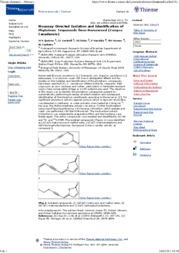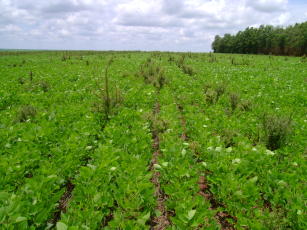Bioassay-directed isolation and identification of phytotoxic terpenoids from horseweed (Conyza Canadensis).
Bioassay-directed isolation and identification of phytotoxic terpenoids from horseweed (Conyza Canadensis).
Author(s): QUEIROZ, S. C. do N. de; CANTRELL, C. L.; DUKE, S. O.; MORAES, R. M.; CERDEIRA, A. L.; NANDULA, V.
Summary: Horseweed [Conyza canadensis (L.) Cronquist, syn. Erigeron canadensis L.], Asteraceae, is a common weed with known allelopathic effects but few studies on the isolation and identification of the phytotoxic compounds have been reported [1]. C. canadensis infests orchards, vineyards, field crops such as corn, soybean and cotton, particularly in herbicide-resistant crops where conservation tillage or no-till systems are used. The objective of this study was to identify the phytotoxic compounds present by systematically performing bioassay-directed isolation and subsequent identification of the bioactive constituents according to Dayan et al. [2]. No significant phytotoxic activity against Lactuca sativa or Agrostis stolonifera was detected in methanol, or water extracts when tested at 1.0mg·mL-1; however, the dichloromethane extract was active. Further fractionation using liquid-liquid partitioning with hexane, chloroform, ethyl acetate and water was performed with the DCM extract. The most active extract (chloroform) was subjected to preparative HPLC and the fractions were tested again. The active compounds were isolated and identified by GC-MS and 1H- and 13C-NMR. The isolated compounds (Figure 1) were identified as (2Z,8Z)-matricaria acid methyl ester, (4Z,8Z)-matricarialactone and (4Z)-lachnophyllumlactone. Compound 3 shows similar activity as
Publication year: 2012
Types of publication: Abstract in annals or event proceedings
Unit: Embrapa Environment
Keywords: Conyza canadensis, Horseweed, Phytotoxic terpenoids
Observation
Some of Embrapa's publications are published as ePub files. To read them, use or download one of the following free software options to your computer or mobile device. Android: Google Play Books; IOS: iBooks; Windows and Linux: Calibre.
Access other publications
Access the Agricultural Research Database (BDPA) to consult Embrapa's full library collection and records.
Visit Embrapa Bookstore to purchase books and other publications sold by Embrapa.


